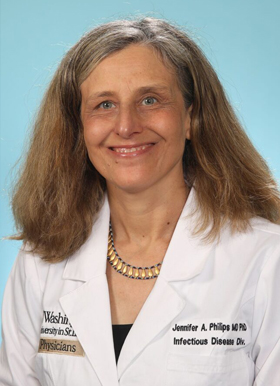The Division of Infectious Diseases, part of the Department of Medicine, is composed of two sections led by two highly distinguished co-directors who work closely together to ensure a fully-integrated multidisciplinary program. The Division is dedicated to delivering excellence in teaching, clinical care and research. Members of the Division are international leaders investigating microbial pathogenesis and host-pathogen interactions; vaccinology and monoclonal antibody therapy; microbial genomics; hospital epidemiology; HIV and sexually transmitted diseases; invasive fungal infections; public health and implementation science; and parasitology and tropical medicine.

Barbara Trautner, MD, PhD, Professor of Medicine, is Co-Chief, Infectious Diseases Division, effective July 1, 2025. Dr. Trautner’s research focuses on diagnostic and antibiotic stewardship, particularly for urinary tract infections (UTIs). She has led trials to disseminate successful antibiotic stewardship interventions, improve the diagnosis and treatment of UTIs in men, develop bacteriophage therapy for UTIs in individuals with spinal cord injuries, and to reduce overdiagnosis of catheter-associated UTI.
Dr. Trautner is recognized nationally and internationally as an expert in the prevention, diagnosis, and treatment of UTIs, as well as in antimicrobial stewardship and the prevention of antimicrobial resistance. She is an extremely active clinical and translational investigator, a passionate educator, and a caring and dedicated clinician. She has been a mentor to many medical students, residents, and fellows.

Jennifer A. Philips, MD, PhD, heads the basic sciences research mission of the division. Philips has been recognized with the Maxwell Finland Award for Excellence in Research and the Astellas Young Investigator Award. She is a member of the American Society of Clinical Investigation (ASCI) and is a Fellow of the American Academy of Microbiology. Philips’ research focuses on Mycobacterium tuberculosis virulence factors, metabolism and immunology.
Philips is recognized for her scientific accomplishments, her collaborative leadership style, and commitment to mentoring the next generation of infectious disease physicians and scientists.
The laboratories of the division are heavily engaged in basic science research encompassing the study of pathogenesis and host defense in infectious diseases using an array of methodologies drawing from:
- Molecular biology
- Biochemistry
- Genetics
- Genomics
- Immunology
- Cell biology
Clinical research within the division includes translational research as well as:
- Epidemiology
- Health services
- Outcomes
- Patient safety
The patient care and research programs of the division are closely allied with the following:
- Pediatric Infectious Diseases Division at St. Louis Children’s Hospital
- Division of Biology and Biomedical Sciences
- Department of Pathology and Immunology
- Clinical Research Training Center
These groups share joint clinical and research conferences and offer a wide range of elective clinical and research rotations. Several members of our faculty have joint appointments in more than one department, and several of our fellows have been trained in both pediatric and adult infectious diseases.
Collaboration across divisions and departments is highly encouraged and opportunities abound for mentored clinical and laboratory-based research at Washington University School of Medicine.
COVID-19 and the Division of Infectious Diseases
Researchers within the division contribute to advances in the basic understanding of infectious diseases and the identification and establishment of better care practices that lead to better patient outcomes. When COVID-19 surfaced, many of our faculty shifted their basic and clinical research efforts to focus on immediate needs of the SARS-coV-2 pandemic.
Michael Diamond, MD, PhD, worked on vaccine development and studies to help improve design of next generation COVID-19 antibody drugs. Jennifer Philips, MD, PhD transformed her lab into a high-security biosafety lab to test compounds for activity against the COVID-19 virus. Rachel Presti, MD, PhD, collaborated with other medical centers to lead outpatient treatment studies and phase 3 clinical vaccine trials. Presti and Jane O’Halloran, MD, PhD worked with Ali Ellebedy, PhD, associate professor of pathology and immunology, of medicine and of molecular microbiology, on a project to track antibody levels in blood samples from COVID-19 survivors and track lasting immunity response after COVID-19 vaccination. Our division rose to the challenges of COVID-19 and enrolled patients into multiple COVID-related clinical trials.
Clay Dunagan, MD, BJC Senior Vice President and Chief Clinical Officer and Infectious Diseases Professor of Medicine, started dialog with local elected officials and public health directors to implement a collective response to the pandemic. An internal team co-led by epidemiologist Jennie Kwon, DO, MSCI, and infectious diseases specialist Hilary M. Babcock, MD, MPH, built a system to trace contacts among patients and employees and monitor and assess changes.
The division provided the state of Missouri with data analysis, modeling and research. Between the Institute for Informatics at the School of Medicine and healthcare informatics at BJC, physicians and civic leaders were able to see where admissions were occurring to understand who was at higher risk for hospital admission or critical care and to predict surges. That level of analysis was not available in many parts of the country.
The thing that probably stands out for everyone over the past two years is the COVID pandemic. Though the early months of the pandemic felt chaotic, looking back I am overwhelmingly impressed with our department’s ability to rise to the historic challenges. ID directed the hospital and community response, rapidly transitioned to COVID research, and enrolled 1000s of patients into COVID-related clinical trials.
Patrick Mazi, MD, ID fellow 2019-2021